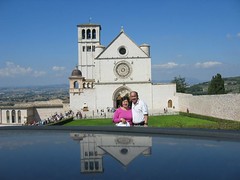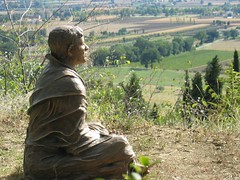 |
| Basilica of St Francis, Assisi Italy |
“We must keep our eyes on Jesus, who leads us and makes our faith complete. He endured the shame of being nailed to a cross….So keep your mind on Jesus, who put up with many insults from sinners. Then you won't get discouraged and give up.” Heb
Who has lived a life like Christ?

In Sep 2007, Pat and I went to Assisi to retrace the footsteps of St Francis in the Umbrian and Tuscan countryside of Italy. I wanted to discover who this man was. What did he bring to the Christian faith? What was he trying to tell us? Was he a recluse? Was he a callow fellow who melodramatically stripped himself naked in the public square to repudiate his past rich and material life; returning to his father every possession to embrace poverty? Was he a lunatic who would speak to animals and birds? Was he an idealist who did not think a second thought when he kissed a leper and ministered to their colony? Was he a masochist who inflicted on his physical body, the very physical sufferings of Christ?
In visiting the places that venerated his memory and learning about his life, I discovered that St Francis was a Christian who took seriously, the commandment to become more like Christ. What was remarkable was that he physically and not just symbolically or spiritually lived out the life of Jesus as he understood from the Gospels. If Christ said he had no place to lay his feet or to place his head, St Francis did that. If Christ said to go two by two to witness without bringing anything other than the cloak on their backs, Francis complied to the letter. If Gospel described when going about witnessing to depend on the hospitality of others and go a-begging for food, Francis followed.
After visiting Carceri, a mountain top retreat that Francis frequented, I wrote, "Once in a while, there comes a man or woman whose life and witness came so close to mimicking the life of Jesus that they reflected God's image so as to inspire all of us".
By his life, ministry, writing and witness, Francis was an example extraordinaire. Francis pointed many in his generation and for 8 more centuries afterwards, towards God. It is no wonder then, that the Basilica of St Francis and all Assisi celebrate the saint. In fact, the brochure claims that it is a spirit filled place.
I do not feel that there is anything wrong to admire St Francis, as I do, so long as one understands his position as a reflection of the infinite beauty of our Lord Jesus. One of his biographers wrote, “Francis presented to the world a new fascinating way to live a Christian life. His greatest contribution was to demonstrate how to live the Beatitudes literally and by doing so helped solve the problems that plague his society. He did that by renouncing its affluence and privileges and taking on poverty chastity and complete obedience.”
By his life, ministry, writing and witness, Francis was an example extraordinaire. Francis pointed many in his generation and for 8 more centuries afterwards, towards God. It is no wonder then, that the Basilica of St Francis and all Assisi celebrate the saint. In fact, the brochure claims that it is a spirit filled place.
I do not feel that there is anything wrong to admire St Francis, as I do, so long as one understands his position as a reflection of the infinite beauty of our Lord Jesus. One of his biographers wrote, “Francis presented to the world a new fascinating way to live a Christian life. His greatest contribution was to demonstrate how to live the Beatitudes literally and by doing so helped solve the problems that plague his society. He did that by renouncing its affluence and privileges and taking on poverty chastity and complete obedience.”
To underscore this, a prayer he made kneeling at a crucifix towards the end stages of his life clarifies, “All highest, glorious God, cast your light into the darkness of my heart. Give me right faith, firm hope, perfect charity and profound humility, with wisdom and perception, O Lord, so that I may do what is truly your holy will. Amen”
One would have thought that such an example would be so hard to follow that few could give up all and join Francis in his calling to live both spiritually and physically the example of Jesus’ life on earth. Instead in just a few years, more than five thousand disciples chose to renounce their riches and to live like him, a life of poverty and service. By the time he died, Francis had already been venerated as a saint; his life has become a stirring example of True Christianity.
Lionel
Lionel
Updated 1st Published 8 Mar 2020






